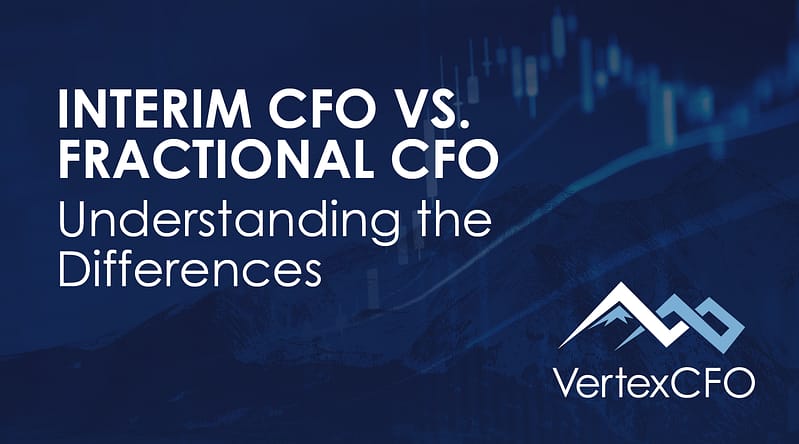Understanding the difference between an interim CFO and a fractional CFO is essential. An interim CFO provides immediate financial stabilization and short-term solutions during urgent shifts, often during leadership changes or crises. In contrast, a fractional CFO offers ongoing, strategic financial oversight tailored to your long-term plans, without the need for a full-time commitment. Each plays a vital role in aligning financial actions with your goals. Explore further to discover which option suits your needs best.
Definition and Scope of an Interim CFO
While exploring the concept of an interim CFO, it’s vital to understand their definition and scope. An interim CFO provides temporary leadership during financial shifts, ensuring continuity and stability. This role is essential when your organization faces sudden departures or needs specialized expertise for short-term projects. As an agile leader, an interim CFO adapts quickly to your unique challenges, leveraging data-driven insights to improve financial strategies. They facilitate seamless changes by implementing innovative solutions that align with your long-term goals. Interim leadership often includes managing cash flow, optimizing financial systems, and preparing for audits. By focusing on these key areas, an interim CFO guarantees that your company maintains its competitive edge during times of change, driving sustainable growth.
Definition and Scope of a Fractional CFO
When considering a fractional CFO, you’re looking at a professional who provides part-time financial leadership tailored to your business’s needs. They offer strategic financial planning without a full-time salary, making it a cost-effective solution for companies seeking high-level expertise. This approach enables scalable financial management, aligning resources with your business objectives efficiently.
Part-time Financial Leadership
How does one delineate the role of a fractional CFO in today’s dynamic business environment? By embracing part-time roles, fractional CFOs provide financial flexibility to innovative companies seeking expertise without the full-time commitment. They guide financial strategy, optimize cash flow, and guarantee compliance, all while adapting to specific business needs.
Fractional CFOs serve as essential part-time financial leaders through:
- Financial forecasting: Provide data-driven insights for future planning.
- Cost management: Identify and implement cost-saving measures.
- Financial reporting: Ensure accurate and timely financial statements.
- Scalability: Offer scalable solutions that grow with your business.
Their expertise allows businesses to navigate complex financial landscapes, ensuring robust fiscal health and supporting strategic growth initiatives, all while maintaining agility in resource allocation.
Strategic Financial Planning
In today’s business landscape, fractional CFOs stand at the forefront of strategic financial planning, offering an essential mix of expertise and adaptability. By focusing on strategic alignment, they tailor financial strategies to match your company’s unique goals, ensuring every financial decision supports long-term growth. Their role involves detailed financial forecasting, which provide you with data-driven insights into future financial trends and potential challenges. This enables you to make informed decisions that drive innovation and sustain competitive advantage. Fractional CFOs analyze quantitative data, translating it into actionable strategies that maximize financial performance. With their analytical approach, they help you navigate complex financial landscapes, ensuring your business remains agile and responsive to change. They’re pivotal in crafting a robust financial foundation for future success.
Cost-effective Expertise
Imagine harnessing top-tier financial expertise without the full-time cost—this is the essence of a fractional CFO. By engaging a fractional CFO, you benefit from cost savings while accessing expert insights tailored to your business. This strategic choice allows you to allocate resources efficiently, focusing on growth and innovation. A fractional CFO provides:
- Targeted financial strategies that align with your specific business needs.
- Scalable solutions that adapt to your evolving requirements.
- Data-driven insights for informed decision-making.
- Risk management to safeguard your financial interests.
- Improved cash flow management for optimal liquidity.
These professionals offer a quantitative advantage, bridging the gap between financial stability and strategic growth. As you innovate, a fractional CFO guarantees your financial foundation remains robust and agile.
Key Differences in Responsibilities
When analyzing the responsibilities of a CFO, you’ll notice distinct differences in strategic decision-making focus, financial reporting duties, and the nature of their engagement—temporary versus ongoing. An interim CFO typically offers short-term, project-based support, concentrating on specific financial strategies and reporting tasks. In contrast, a fractional CFO provides continuous, thorough oversight, ensuring long-term financial stability and strategic alignment.
Strategic Decision-Making Focus
Although strategic decision-making is a critical aspect of a CFO’s role, the focus and execution of these responsibilities can vary considerably depending on the organization’s size and industry. Interim CFOs often prioritize short-term strategic alignment, addressing immediate financial challenges using established decision-making frameworks. In contrast, fractional CFOs might focus on broader strategic initiatives, optimizing long-term growth, and innovation potential.
Consider the following aspects to visualize their differing approaches:
- Interim CFO: Rapidly assess and realign financial strategies.
- Fractional CFO: Continuously refine strategic goals for sustainable growth.
- Interim CFO: Emphasize immediate financial stabilization.
- Fractional CFO: Develop long-term, innovative financial solutions.
Both: Essential in ensuring strategic alignment with organizational objectives.
Each role contributes uniquely to your organization’s strategy and success.
Financial Reporting Duties
While financial reporting is a fundamental task for any CFO, the specific responsibilities can differ markedly between an interim and a fractional CFO. As an interim CFO, you’re often tasked with immediate, intensive financial statement analysis, ensuring the organization swiftly meets all compliance requirements. Your role demands a thorough exploration into existing reports to stabilize financial operations during shifting periods.
In contrast, a fractional CFO takes a long-term strategic view, providing ongoing financial oversight. You focus on optimizing processes for innovation, maintaining compliance, and enhancing the quality of financial data. By leveraging advanced analytics, you confirm the company’s financial statements are not only accurate but also insightful, aiding in proactive decision-making. Both roles require precision, but their scope and execution differ considerably.
Temporary vs. Ongoing Support
Distinguishing between temporary and ongoing support reveals key differences in the responsibilities of interim and fractional CFOs. Interim CFOs offer temporary solutions, stepping in during crises or shifts, guaranteeing immediate financial stability. Their involvement tends to be short-term and focused. In contrast, fractional CFOs provide ongoing engagement, contributing to strategic growth and innovation over extended periods. Their role is tailored for continuous improvement and long-term planning.
- Focus on immediate financial stability
- Short-term involvement for interim CFOs
- Fractional CFOs drive long-term innovation
- Temporary solutions vs. ongoing engagement
- Strategic growth as a key objective
Typically, interim CFOs might handle emergency cash flow management, while fractional CFOs focus on sustainable financial models. Understanding these distinctions guarantees you leverage the right expertise for your business needs.
Situations Ideal for Hiring an Interim CFO
When navigating financial uncertainty or undergoing organizational restructuring, hiring an interim CFO can be a strategic decision offering both flexibility and expertise. Interim leadership is particularly advantageous during financial shifts such as mergers, acquisitions, or leadership changes. You’ll benefit from their ability to assess and stabilize financial operations swiftly, ensuring continuity without the long-term commitment of a permanent hire. An interim CFO provides cost-effective solutions by allocating resources efficiently and identifying opportunities for financial optimization. This role is also essential when your organization faces tight deadlines for financial reporting or needs to meet regulatory compliance. By engaging an interim CFO, you gain access to high-level financial acumen and strategic insights, positioning your company for innovative growth.
Situations Ideal for Hiring a Fractional CFO
How can you determine if hiring a fractional CFO is the right move for your organization? If your company needs financial expertise without a full-time commitment, a fractional CFO offers flexible and scalable solutions tailored to your needs. Consider these situations:
- Rapid growth: You need strategic financial guidance to support expansion.
- Budget constraints: Limited funds prevent hiring a full-time CFO.
- Project-based needs: Specific financial projects require expert oversight.
- Interim adjustment periods: Maintain financial leadership during C-suite changes.
- Innovative ventures: New product launches or market entries that demand seasoned financial insight.
These scenarios highlight when leveraging a fractional CFO’s expertise can provide your organization with the agility and strategic advantage needed to navigate complex financial landscapes efficiently and innovatively.
Cost Implications and Budget Considerations
Understanding the financial advantages of hiring a fractional CFO can further illuminate its benefits to your organization. Engaging a fractional CFO provides a strategic opportunity to reduce costs, minimizing expenses compared to a full-time CFO. You can allocate resources more effectively, directing funds toward innovation and growth. With flexible engagement models, fractional CFOs provide tailored services, aligning with your financial goals without long-term financial commitment.
Budget forecasting becomes more precise, leveraging their expertise to anticipate financial trends and allocate resources efficiently. This dynamic approach helps you maintain a competitive edge.”, adapting swiftly to market changes. Fundamentally, a fractional CFO empowers you to optimize your financial strategy, enabling efficient cost management and informed decision-making, all within a sustainable budget framework.
Conclusion
Navigating the financial landscape with an Interim or Fractional CFO is like choosing the right compass for your journey. Interim CFOs are your emergency navigators, steering through storms with focused, short-term expertise. Fractional CFOs, on the other hand, provide ongoing guidance, ensuring steady progress over time. Consider your organization’s immediate needs and long-term goals. Weigh the cost implications and cultural impact carefully, as these decisions can greatly alter your course and determine your financial success.
VertexCFO specializes in making sense of complex financial information, providing CEOs and entrepreneurs sound data to run their businesses – including budgeting, forecasting, cash management, and accuracy of monthly financials. vertexcfo.com provides finance and accounting services in the capacity of outsourced CFO, outsourced controller, interim CFO, interim controller, part time CFO, part time controller, fractional CFO, fractional controller and temporary CFO services.

